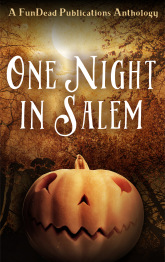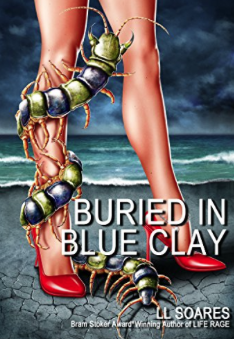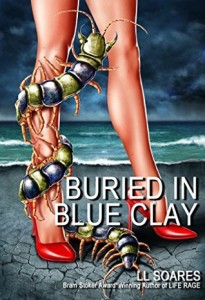Hey there, people!
My name’s Rob Smales, and when I found out Stacey needed a blog post for this month’s Writers’ Block, I drove straight to her house to ask if maybe I could share some thoughts with you. There’s something on my mind, and I think all my friends are a little tired (read: are sick to death) of hearing about it. Stacey graciously said yes . . . at least, I think that’s what she was screaming through the gag after I locked her in the trunk. See, she’s a bit of a control freak about her blog . . .
Anyhoo, it’s about submission guidelines. They’re really a thing, people.
For those of you who are yet to submit a story for possible publication, submission guidelines are the little list of dos and don’ts publishers and editors put out there to say precisely what they are looking for and, usually, how to send it to them.
“We here at Buried Bones Press are putting together our annual Simian Psycho Stories anthology. We’re doing a when anally aware animals attack theme this year, so what we’d like are some humorous horror stories about monkeys killing people with rectal thermometers. We’re paying $50 upon publication for each bloodthirsty baboon biography accepted, and if you could get those brachiating butchers to pierce their prey with those poop-chute temperature-takers in a minimum of 3,000 words, a maximum of 7,000 words, and in double-spaced, 12 pt. Times New Roman, it would be greatly appreciated.”
There, you see? What they want, and how they want it. I’ve been writing for a few years now, and I’ve always looked at submission guidelines that way: it’s someone offering me money if I give them what they need, and they’re telling me just what they’re looking for. How awesome is that?
Some people, though, don’t see it that way. Some would read that paragraph above and say “Right there! It says horror! I’ll send them 1,500 words about a serial killer coming back from the dead to beat high school principals to death with his giant zombie dong!”
They seem to forget those guidelines were written by a person, one who either wants or needs something pretty specific. Someone with feelings just like you and me. Hell, I’m currently taking submissions for an anthology I’m editing (no, not the butt thermometer primate one, but that is interesting), so right now, this is me.
Look at it this way: you go to a restaurant, peruse the menu, and make your selection very carefully. You tell your server exactly what you want: a porterhouse steak with mashed potatoes and carrots and a nice little dinner roll on the side (vegans reading this, please substitute any tubers and greens you like). Then, when your plate arrives, and you see it’s covered with shrimp scampi, do you say “Oh, thank you”? Or are you like me, and point at the plate with a slightly confused expression, saying “Excuse me? This isn’t what I ordered.”
You point and ask, don’t you?
And though that chef may make a shrimp scampi so good it’d make me quit my job just so I’d have more time to eat it, it’s still not what I ordered. As a writer, you’re the waiter in that scenario, and the only way you’re going to get the money you’re looking for―that big tip at the end of the meal—is by giving the customer what they want. A small error is no big deal (“I ordered carrots and you brought me peas”), but getting everything wrong—or even worse, insisting what you’ve brought them is what they really need—and you can kiss that tip goodbye.
 More than that, you’ll be remembered the next time around. You do that, don’t you, at a place where you’ve received bad service? “Oh, seat us anywhere—but not at any of that scampi-slinging son of a bitch’s stations, all right?” They have a reputation with you now for being difficult, and you avoid them if you can . . . and remember what I said about you the writer being the server in this situation?
More than that, you’ll be remembered the next time around. You do that, don’t you, at a place where you’ve received bad service? “Oh, seat us anywhere—but not at any of that scampi-slinging son of a bitch’s stations, all right?” They have a reputation with you now for being difficult, and you avoid them if you can . . . and remember what I said about you the writer being the server in this situation?
Yeah. Don’t be a dick.
There’s a colder reason for paying attention to stated minimums and maximums, too. A logical, rational reason.
It’s a simple question of numbers—the publisher’s numbers, not yours. There’s a certain budget for any project, and though most of it is allocated for buying stories, it’s still a budget. In order to have a book long enough to appeal to the public, for a price with which the publisher could reasonably expect to recoup their expenditures—never mind actually making any money—they have a specific page count range in mind. When setting the word count minimums and maximums in their guidelines, they have a certain number of stories they can afford, and a hopeful average word count per story to help make those pages.
If a publisher is paying a flat fee per acceptance, too many stories below that stated minimum throws those numbers off. They could get those pages back by simply buying more stories . . . but that would eat up more of the budget, and they’d have to skimp on some of the other necessities, like cover art, editing, etc., and then they wouldn’t be handling the accepted authors with the professionalism those writers deserve.
Paying by the word bites the publishers on the other ass cheek. Accepting a story that’s twice the stated maximum means there’s one fewer story they can afford—unless, of course, they dip into the rest of the budget, and we’ve already covered what a mess that can make.
It can also be difficult to put together a balanced book when one of the dozen stories within is a 1,000-word flash fiction, while another is a 25k novella. And don’t even ask me to explain the math that goes into royalty splits. It’ll make your head spin.
So, are we clear? Publishing is a bit of a numbers game (a game that you, as a footloose and fancy free writer, don’t have to play, thank God), and the submission
guidelines are showing you the rules of the game. Submit within those rules—oh, and don’t be a dick—and your chances of success in the game always (repeat: always) take a turn for the better. Remember that, and you’ll soon be a writer people are looking forward to working with, rather than the shrimp scampi-slinging asshat everyone wants to avoid.
Do you hear sirens? Aw, hell! I forgot to take Stacey’s phone away before I put her in the trunk! Okay, uh, I have to get a move on. Gotta put Stacey on the lawn and try to get out of here before I make the evening news.
Talk to you later!
 Rob Smales is the author of Echoes of Darkness and Dead of Winter, as well as over two dozen published short stories, several of which have won awards and all for which he followed the guidelines to the letter before submitting. When he’s not garnering critical acclaim for his writing, he works as one half of the editing team at S & L Editing.
Rob Smales is the author of Echoes of Darkness and Dead of Winter, as well as over two dozen published short stories, several of which have won awards and all for which he followed the guidelines to the letter before submitting. When he’s not garnering critical acclaim for his writing, he works as one half of the editing team at S & L Editing.







 More than that, you’ll be remembered the next time around. You do that, don’t you, at a place where you’ve received bad service? “Oh, seat us anywhere—but not at any of that scampi-slinging son of a bitch’s stations, all right?” They have a reputation with you now for being difficult, and you avoid them if you can . . . and remember what I said about you the writer being the server in this situation?
More than that, you’ll be remembered the next time around. You do that, don’t you, at a place where you’ve received bad service? “Oh, seat us anywhere—but not at any of that scampi-slinging son of a bitch’s stations, all right?” They have a reputation with you now for being difficult, and you avoid them if you can . . . and remember what I said about you the writer being the server in this situation? Rob Smales is the author of Echoes of Darkness and Dead of Winter, as well as over two dozen published short stories, several of which have won awards and all for which he followed the guidelines to the letter before submitting. When he’s not garnering critical acclaim for his writing, he works as one half of the editing team at
Rob Smales is the author of Echoes of Darkness and Dead of Winter, as well as over two dozen published short stories, several of which have won awards and all for which he followed the guidelines to the letter before submitting. When he’s not garnering critical acclaim for his writing, he works as one half of the editing team at 



 Our first guest is an old friend of the show,
Our first guest is an old friend of the show,  Our second guest is Naomi Moore, creator and force behind the new publication
Our second guest is Naomi Moore, creator and force behind the new publication 




 The latest offering from Bram Stoker Award winner L.L. Soares (Life Rage) is Buried in Blue Clay (2017, Post Mortem Press). We’re immediately on board (both literally and figuratively) with Reddy Soames, a writer who’s not sure he’s still got what it takes, and drinks too much while he ponders this question. He’s heading back to his hometown of Blue Clay to investigate the urban legends of his youth in the hopes of getting a book written based on them. Growing up, he’d heard rumors of jellyfish-like aliens with ties to the azure-sanded beaches of Blue Clay.
The latest offering from Bram Stoker Award winner L.L. Soares (Life Rage) is Buried in Blue Clay (2017, Post Mortem Press). We’re immediately on board (both literally and figuratively) with Reddy Soames, a writer who’s not sure he’s still got what it takes, and drinks too much while he ponders this question. He’s heading back to his hometown of Blue Clay to investigate the urban legends of his youth in the hopes of getting a book written based on them. Growing up, he’d heard rumors of jellyfish-like aliens with ties to the azure-sanded beaches of Blue Clay.






